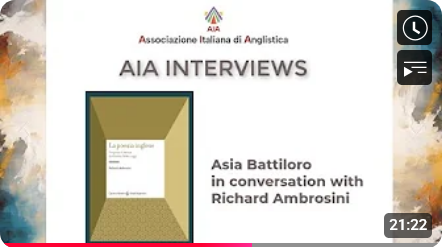Segreteria AIA 13:51 (4 ore fa) CALL FOR PAPERS: COGNITION & THE MEDIA 30-31 October 2025 Università degli Studi “G. d’Annunzio di Chieti-Pescara” We are pleased to announce the International Conference on Cognition and the Media, a multidisciplinary event bringing together scholars from media studies, cognitive science, translation studies, linguistics, psychology, and related fields. Drawing inspiration from the work of scholars such as Gilles Fauconnier, George Lakoff, Ronald W. Langacker and Mark Turner (cognitive linguistics), as well as more recent contributions by Giuseppe Balirano (digital and social media, multimodality, and multimodal stylistics), Jorge Díaz-Cintas (screen and digital media, cybersubtitling and cyberdubbing ), Yves Gambier (translation, cognition, and media accessibility) and Marcello Giovanelli (stylistics, cognitive studies, and the public humanities), the conference seeks to explore the dynamic relationship between cognitive processes and media forms — including film, television, digital platforms, games, and social media — with a particular emphasis on translation and audiovisual practices. We aim to foster dialogue on how media influence, shape, and are shaped by cognitive mechanisms such as perception, attention, memory, emotion, and narrative comprehension, especially in contexts involving multilingualism, accessibility, and intersemiotic mediation. At the heart of this conference is a key question: How do media shape and reflect the ways we think, feel, and communicate—especially across languages and cultures? In an era of saturated information, real-time interaction, and constant cross-linguistic exchange, cognition is at the centre of how media function and how meaning moves across borders. As cognitive science deepens our understanding of how we perceive, process, interpret and memorise information, it raises critical questions for media scholars, translators, and communication experts. We invite papers that explore the dynamic intersection of cognition and media from multiple disciplinary perspectives. Submissions may address (but are not limited to): Cognitive theories of media consumption and productionMedia influence on perception, attention, memory, and emotionNarrative cognition in journalism, film, and digital storytellingMultilingual media processing and translation receptionCognitive approaches to subtitling, dubbing, and voiceoverThe role of cognitive load in audiovisual translationCognitive models of narrative and storytelling in mediaEye-tracking and neurocognitive studies in translation researchEmotion and affect in digital storytellingThe cognitive impact of multilingual media environmentsTranslating culture, humour, and emotion across mediaNeurological and psychological studies of translation and media receptionPerception of Time, Technology and Media in the Imagined 19th Century“Steam-powered” Media: Print, Telecommunication, and Information ManipulationHistorical cognition and media technologies (e.g., clocks, automatons, memory devices)Artificial Memory in Alternative Worlds PROPOSALS – SUBMISSION GUIDELINESINDIVIDUAL PAPERS (20 mins) Please attach a single document including:Title and abstract of your proposal (300 words max.)5 keywordsAuthor’s name, affiliation, email address and biography (100 words max.) Email: cognition.media2025@unich.it Deadline for submissions: 22nd September 2025Notification of acceptance: 30th September 2025Registration fee deadline: 4th Octobert 2025Conference fee: 200 EUR (standard) / 150 EUR (PhD student) by 4th October 2025

